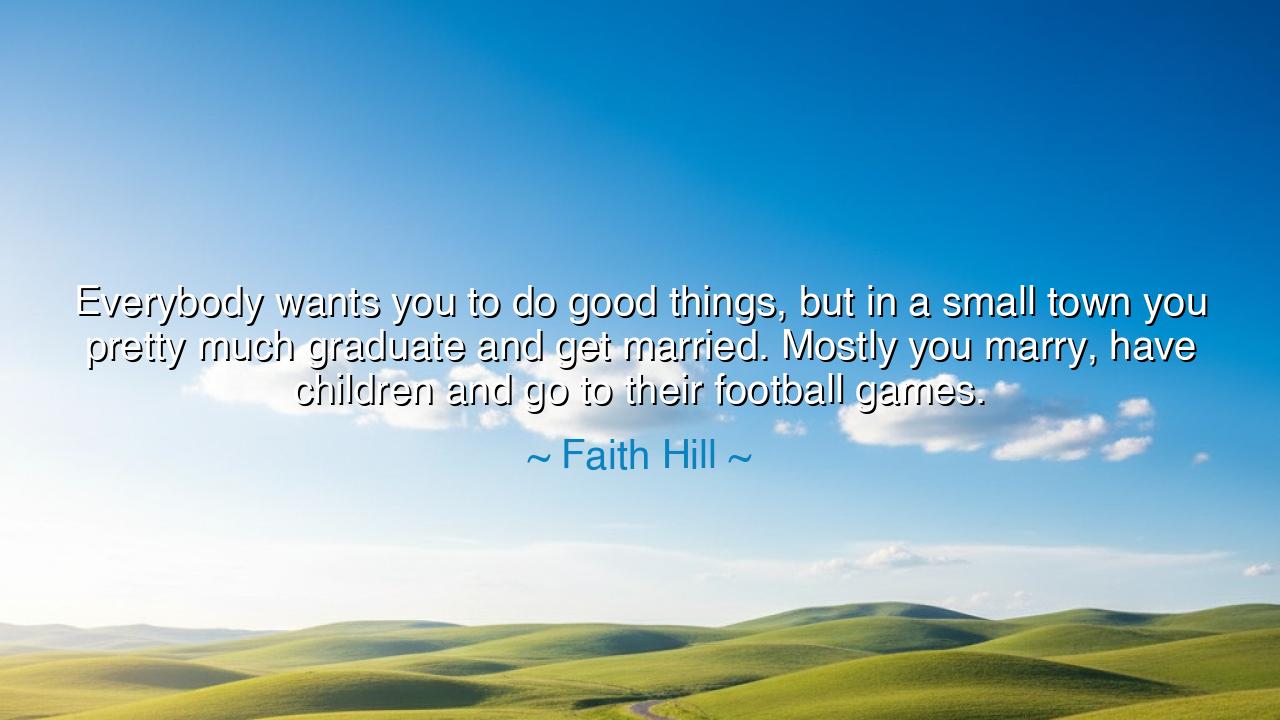
Everybody wants you to do good things, but in a small town you
Everybody wants you to do good things, but in a small town you pretty much graduate and get married. Mostly you marry, have children and go to their football games.






The words of Faith Hill — “Everybody wants you to do good things, but in a small town you pretty much graduate and get married. Mostly you marry, have children and go to their football games.” — rise like a quiet hymn of memory and longing. They speak of the sweetness and the sorrow of small-town life, where the rhythm of days is gentle, familiar, and slow, yet often enclosed within invisible boundaries. Beneath the warmth of family and community, Hill’s reflection carries a deeper question — the eternal struggle between belonging and becoming, between the comfort of the known and the call of the greater world beyond.
In the simple cadence of her words, there is both love and lament. The small town is not a prison, but it is a circle — one that nurtures and protects, yet can also confine. The people within it wish each other well; they dream of one another’s happiness. Yet their idea of happiness is bound by tradition: to graduate, to marry, to raise children, to watch them play under the same Friday night lights. It is a beautiful cycle, but for some souls — like Faith Hill’s own — that cycle becomes too small for the growing spirit. Her quote, then, is not a rejection of her roots, but an acknowledgment of the moment when the heart feels the pull of something larger, something uncharted.
The story of Faith Hill herself gives life to these words. Born in Star, Mississippi, she was raised in a world where life’s path was laid out simply and honorably. Yet within her stirred a voice that sang of distant places — a yearning for the stage, for the freedom of expression, for the great unknown. To leave such a world is never easy; it means stepping away from the people who love you, from the fields and faces that shaped your childhood. It is an act of courage that few understand until they, too, feel the ache of destiny calling. And so, like the heroes of old who left their villages to follow a star, Faith answered that inner summons, carrying her small town within her, but no longer bound by it.
This conflict between community and calling has echoed through every age. Think of Joan of Arc, a farmer’s daughter from Domrémy, who heard voices calling her to a purpose beyond her village, beyond even her nation’s comprehension. She left the comfort of home to lead armies and shape history, her courage burning brighter than fear. Or consider Abraham Lincoln, born among the quiet farms of Kentucky, who rose from the soil to speak with the voice of a nation. Like Hill, they began in simplicity, but their hearts were tuned to a wider harmony. The lesson is the same: even the smallest beginnings can contain infinite horizons.
Yet Hill’s words do not mock the small-town way — they honor it, even as they transcend it. For there is beauty in the ordinary, holiness in the rhythm of family life — in the shared meals, the laughter at local games, the stories told on porches beneath the stars. It is a kind of heaven on earth, a refuge for weary hearts. The danger lies only when comfort becomes complacency — when the soul’s flame is dimmed by fear of leaving the familiar. The ancients taught that each person must live according to their daimon, their inner spirit or purpose. For some, that purpose is to tend the home fire; for others, it is to wander, to build, to sing — to bring the light of the village into the world.
Faith Hill’s reflection teaches us that to leave does not mean to abandon. She carried the values of her small town — its love, humility, and strength — into her music, where they became the foundation of her success. The girl who grew up among quiet roads sang songs that reached across oceans, yet her heart still beat with the rhythm of that hometown simplicity. This is the harmony the ancients spoke of: to remember your roots even as you reach for the heavens, to honor the past without being imprisoned by it.
So let this be the lesson for all who listen: your beginnings are not your boundaries. Love where you come from, but do not let it define the limit of your becoming. If your spirit calls you beyond the fields of your birth, go bravely — and carry that soil in your hands, not as a chain, but as a blessing. And if your calling is to remain, then live that life with grace, for meaning dwells not in fame or distance, but in truthfulness of heart.
In the end, Faith Hill’s words remind us that the map of life is written in both roots and wings. The small town teaches us how to love; the wide world teaches us how to live. Blessed is the one who learns to hold both — who can stand beneath the stadium lights of the world and still remember the soft glow of home.






AAdministratorAdministrator
Welcome, honored guests. Please leave a comment, we will respond soon